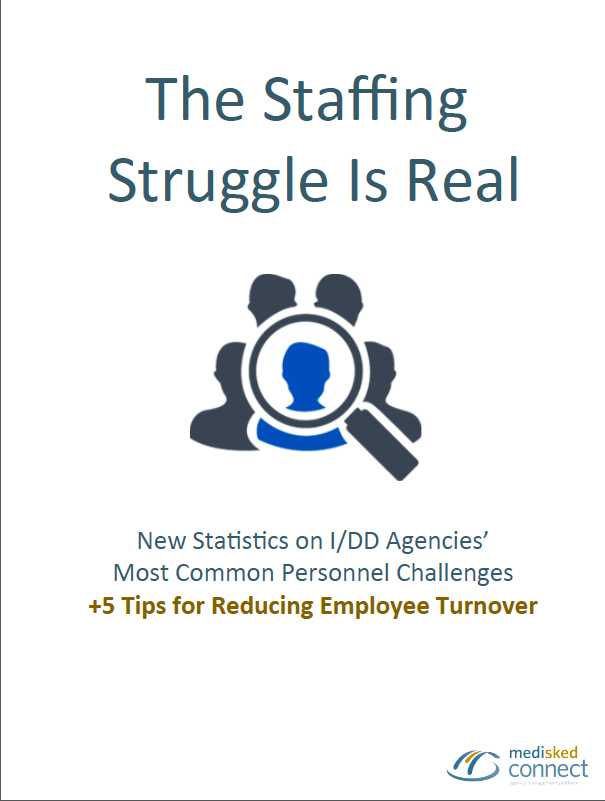I'm super excited to announce our brand new, just published eReport, The Staffing Struggle Is Real.
Read More
The MediSked Blog
Elizabeth Chatterton
Recent Posts
Don't Miss Our Latest eReport: The Staffing Struggle is Real
Posted by Elizabeth Chatterton on Fri, Feb 05, 2016 @ 03:07 PM
Tags: Staff Management
The Most Important Thing You Need to Know Before Changing the Way You Do Things
Posted by Elizabeth Chatterton on Wed, Feb 03, 2016 @ 02:04 PM
If there's one thing we deal with a TON here at MediSked, it's change.
Whether we're developing new features to make our software offerings better, helping an agency go paperless with MediSked Connect, or customizing the technology a state government needs to move to a managed care model, we're consistently asking people to change the way that they do things.
When you factor in that they've likelly being doing it that way for a very long time, it's not always an easy task.
We feel that way too. We hire some of the best and brightest people on the planet and that kind of talent usually has some ideas on how to do things smarter - and better. That doesn't make it any less scary to try it, however. And there's one very important thing you need to understand about why people resist and how to get their support and enthusiasm.
Are you ready? This is important! Here it is:
People are not opposed to change - they are opposed to being changed.
Knowing that can (and will) make all the difference. If you force people to do something that scares them, they will not respond well.
Two of the most profound fears that human beings face are the fear of failure and the fear that they cannot adapt or learn something new. If they are involved, informed, and reassured that they won't fail because you'll provide them with all of the resources and support they need to succeed, they're more likely to embrace the change with excitement - rather than resistence.
Tags: Change Management
The Top 4 Reasons Hospital Software Isn't Right for the I/DD Space
Posted by Elizabeth Chatterton on Mon, Feb 01, 2016 @ 09:06 AM
EMR (Electronic Medical Record) and EHR (Electronic Health Record) systems are great for hospitals and doctors' offices but when it comes to agencies supporting people with intellectual and developmental disabilities, they're almost never the right fit.
Here's why:
1. Provider agencies and medical care facilities are very different places:
EMRs are designed to be used in hospitals and offices, and most of them are sold to be used out-of-the box, without many opporturinties for modification or customization. Providing direct supports is not the same as medical treatment and the kind of records used in hospitals can't capture the entire story (or all of the required documentation) that comes along with supporting a person with a developmental disabiliy.
2. The goal isn't to "discharge" people with I/DD
EMRs follow a workflow that clearly has a beginning, middle and end. Their medical nature has them focused on records management and the creation and documentation of patient assessments and treatment plans. The whole idea is to diagnose the issues, treat the “patient”, and eventually discharge them. In fact, most EMRs include a module called Discharge and Transfer Management.
Programs specifically designed for the I/DD space use a workflow focused on providing a lifetime of services and supports to ensure the health, welfare and safety of the individuals they serve long term. Rather than generating dictations and lab orders, the focus is on goal plans, service notes, and DSP management.
3. When you buy an EMR you get a whole lof of stuff you don't need
Because their needs are so drastically different, provider agencies who have implemented EMR systems intended for the medical world find that the end up with a little bit that's almost what they need - and a whole lot of modules and workflows that have no relevance to them. In some cases, they have even tried to change some of their own processes to fit the system they bought - which is both risky and costly.
4. You're also going to need a whole lot of other software programs
Because EMRs are not designed for provider agencies, they don't bring billable hours, service notes, and pay rates together. You'll still need to manage all of those things and it's unlikely those systems will integrate with one another, which creates a lot of potential for dual-entry and extra work.
There are more reasons for sure - but the ones outlined above are the biggest issues we've seen. If you'd like to see a software platform specifically built for the needs of a provider agency in the I/DD space, make sure to check out MediSked Connect. We may be biased, but we think it does some pretty amazing things.
Tags: EHR
In The Driver's Seat: A Great Resource for Self-Direction
Posted by Elizabeth Chatterton on Fri, Jan 29, 2016 @ 09:02 AM
Every so often you meet someone and you know immediately that they're genuine, passionate, and committed to doing what it takes to make the world a better place.
Joyce Steel and Cindy Lill both gave me that impression. They're each a force (for good) to be reckoned with - and together they're In The Driver's Seat - a new organization committed to helping people with developmental disabilities and their families take control of their lives. They do this by helping them navigate the initially overwhelming Self-Directed Service system.





